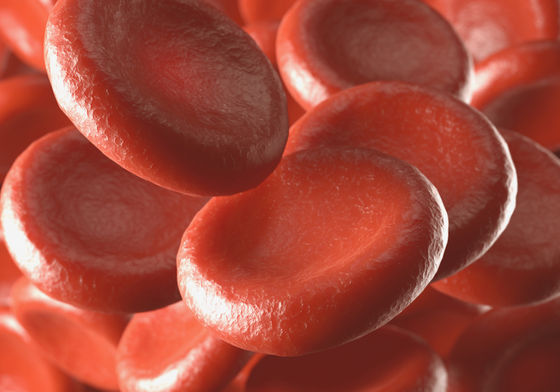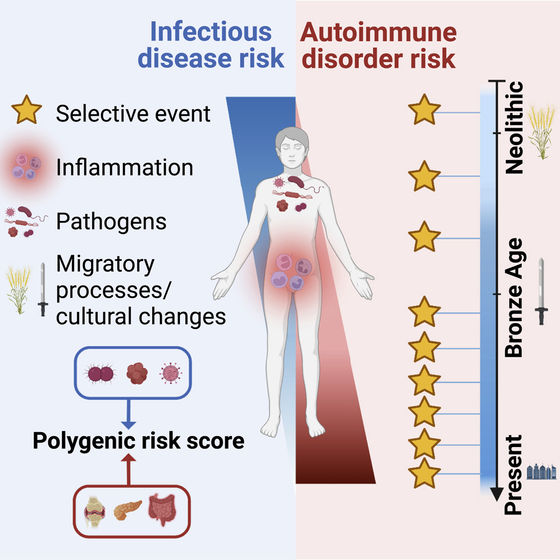It turns out that natural selection by infectious diseases is related to increased risk of inflammatory diseases

A genetic analysis of Europeans dating back 10,000 years has identified links between genetic adaptations to protect against the threat of infectious diseases and inflammatory and autoimmune diseases. rice field.
Genetic adaptation to pathogens and increased risk of inflammatory disorders in post-Neolithic Europe: Cell Genomics
Using paleogenomics to elucidate 10,000 years of immune system evolution | Institut Pasteur
https://www.pasteur.fr/en/press-area/press-documents/using-paleogenomics-elucidate-10000-years-immune-system-evolution
British biologist J.B.S. Holden wrote in the 1950s that 'mutations that cause abnormalities in red blood cells are common in Africa because of the infections that claim so many lives each year in that region. It may be to protect yourself from malaria, which is a disease.' This theory that pathogens represent one of the strongest selective pressures on humankind was later supported by several studies, but how it was during the era of infectious disease epidemics and how its impact has changed in modern times. Many questions remain about how it affects the risk of inflammatory and autoimmune diseases.

Therefore, a research team led by Gaspard Kerner and others at the Pasteur Institute in France conducted a study to analyze the genomes of 2879 people who lived in Europe over the past 10,000 years. As a result, we obtained three main findings regarding the long-term effects of adaptation to infectious diseases on human genes.
The first is that there has been a rapid increase in mutations in Europe over the course of 10,000 years. This mutation, which evolved by ``positive natural selection'' that is advantageous for surviving and leaving offspring, is present in 89 genes mainly related to innate immune responses, such as genes responsible for the ABO blood group system and Genes responsible for viral activity were typical examples.
Of particular interest to the team is that most of these 'positive natural selections' of genetic adaptation to pathogens occurred relatively recently, about 4,500 years ago, around the beginning of the Bronze Age. That's it. The researchers believe that this acceleration of change may be due to strong selective pressures, such as those associated with serious infectious diseases such as the plague.

The second finding was that, contrary to the first discovery, ``negative natural selection'', in which specific gene mutations plummeted over the past 10,000 years, also began in the Bronze Age. Many of these adverse mutations were found in genes associated with innate immune responses and were experimentally confirmed to have a detrimental effect on infectious disease risk.
Finally, the research team concludes, ``Natural selection from pathogens in the past has favored genes for resistance to infectious diseases, increasing the risk of modern autoimmune and inflammatory diseases. I verified the theory that Specifically, thousands of mutations known to increase susceptibility to tuberculosis, hepatitis, HIV, novel coronavirus infection, rheumatoid arthritis, systemic lupus erythematosus, and inflammatory bowel disease were investigated.
Analyzes show that mutations associated with an increased risk of inflammatory diseases such as Crohn's disease have increased in frequency over the past 10,000 years, while mutations associated with an increased risk of developing infectious diseases have decreased in frequency. It was confirmed that

Lluis Quintana-Murci of the Pasteur Institute, who led the research team, said, 'The results of this study show that Europeans have been at increased risk of inflammatory diseases since the Neolithic period, and that mutations that increase resistance to infectious diseases are a positive natural trait. It shows that you are being chosen,' he said.
Related Posts:
in Science, Posted by log1l_ks







